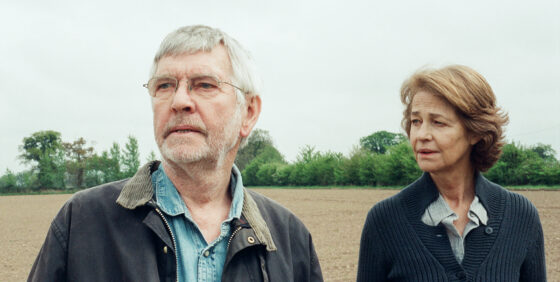TIFF 2015 | 45 Years (Andrew Haigh, UK)—Special Presentations
By Angelo Muredda
Andrew Haigh branches out from his chronicles of transitory love among gay male urbanites with 45 Years, one of the shrewdest follow-ups to a calling-card picture in recent memory. The filmmaker trades the Nottingham setting of Weekend (2011) and the San Francisco clubs of his HBO series Looking for the flatlands of Norfolk, surveyed in a series of countryside tableaux that announce the arrival of each morning in the course of an increasingly fraught week. Placid though the field looks each time we see it from afar, rot has set in within the household of Kate (Charlotte Rampling) and Geoff (Tom Courtenay), whose marriage begins to unravel on the verge of their 45th anniversary. The catalyst for this disintegration is the re-emergence of the frozen body of Geoff’s long-lost lover Katya from its icy tomb in the Swiss Alps—a literal resurfacing of the dead past that is very much on Geoff’s mind in the lead-up to the party.
Unnervingly quiet and rigorously orchestrated, 45 Years is the work of an accomplished filmmaker who could stand to take more chances. Fluent as he is in the kind of offhanded characterization we tend to see from seasoned realists—Kate and Geoff reveal themselves here and there in wordless gestures and passive-aggressive grumbles of assent—Haigh often seems to be hitting his marks at alarmingly regular intervals, doling out his dramatic beats courtesy of an intravenous drip feed. The result of Haigh’s ostentatiously prosaic aesthetic—best encapsulated by an overdetermined composition that finds a shadowed Kate flanked on her right by a spectral slide-show projection of her deceased, black-clad romantic rival—is often uncanny. Every intimate two-hander becomes an over-scripted one-act; every new scrap of previously concealed information (especially that concerning the couple’s conspicuous childlessness) lands with the brute force of an exclamation mark. 45 Years may be annoyingly precise in its execution, but it’s nuanced enough that it doesn’t always matter, skillfully evoking literary antecedents like James Joyce’s “The Dead” and Virginia Woolf’s Mrs. Dalloway without being too fussy about it, and building to a hell of a coda that stings in spite of its inevitability.
Angelo Muredda- « Previous
- 1
- 2



